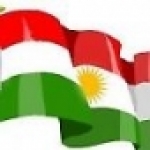A supporter of Ayad Allawi
Enlarge Muhannad Fala'ah/Getty Images
A supporter of former Iraqi Prime Minister Iyad Allawi, head of the secular Iraqiya dances at an election campaign rally on March 3, 2010 in Baghdad, Iraq. The election has passed but results have yet to be confirmed.
A supporter of Ayad Allawi
Muhannad Fala'ah/Getty Images
A supporter of former Iraqi Prime Minister Iyad Allawi, head of the secular Iraqiya dances at an election campaign rally on March 3, 2010 in Baghdad, Iraq. The election has passed but results have yet to be confirmed.
text sizeAAA
March 9, 2010
The elections in Iraq appear to have gone smoothly, and preliminary estimates suggest 55–60% turnout. Now, however, the rough patch will begin. Early estimates suggest incumbent Prime Minister Nuri al-Maliki won perhaps a third of the vote with former interim Prime Minister Ayad Allawi second. Neither, however, came close to a majority. Now the horse-trading will begin.
The CIA favors Ayad Allawi, but should proceed with caution. While Allawi paints himself as the secularist and liberal hope, he has a past, not just as a Baathist in the 1970s, but also as interim Prime Minister in 2004–2005. Iraqis are upset with corruptio—-- and many of Maliki's ministers are expert at i—-- but Allawi hemorrhaged popularity after his term precisely because his administration became so tainted with corruption. And while Allawi is attractive to many in the United States because he is the least pro-Iranian, his ties to Syri—-- the gateway for foreign fighters entering Ira—-- is troubling. He is unpopular among many Shi'a for ordering the assault on Najaf in November 2004 although, frankly, I'm glad he did so given the importance of that move in neutralizing Muqtada al-Sadr. Allawi has also lost credibility by living in the Green Zone , when he's in Iraq at all: That's good for his relations with U.S. diplomats, but bad for relations with Iraqis.
Maliki may have won the plurality, but Iraqis have a history now (thankfully) of coalescing against the incumbent fearing he will become too powerful. This could open the path for a third party — perhaps someone from the Iraqi National Alliance, or perhaps someone from Allawi's or Maliki's list, but not either of them — to become a compromise candidate. In addition, all these lists are fractious: The Kurds may enforce party loyalty, but the Shi'a can't and so we might have some candidates bolt and announce that they will go their own way.
Watch the Kurds: Preliminary results emailed from journalists suggest the upstart Gorran list defeated incumbent President Jalal Talabani's Patriotic Union of Kurdistan (PUK) in Sulaymani, and came a close second to Kirkuk. This leaves the future of Talabani in doubt. Nevertheless, with the Americans withdrawing, the Kurds will try to negotiate hard, knowing their leverage will only decrease. However, if the Kurds negotiate too hard, it is possible that two or three of the main Arab blocs will form a coalition and exclude the Kurds, a recipe for violence. Do not assume that a violent outcome is something that Kurdish leaders oppose. Masud Barzani may find it in his political interest to fan the flames of sectarian violence in order to cement his position and perhaps force U.S. troops to stay.
It will be interesting to see if President Obama will extend the stay of some U.S. forces. Even in private briefings, it's clear that the timeline is political and the White House is not too flexible on tying troop withdraws to the realities on the ground. Further, General Odierno's public comments have hampered the ability of U.S. troops to remain quietly should the military need persist, by inserting the troop presence in a high-profile manner into the Iraqi nationalist debate. And, indeed, as the negotiations get rough, many Iraqi politicians will position themselves against U.S. presence (much the way Obama did in the 2008 elections). It's an easy position to take when a candidate, harder to take when in a position of responsibility.





